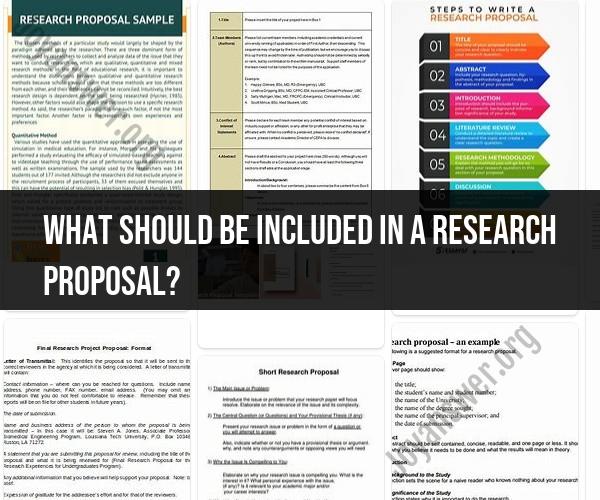What should be included in a research proposal?
A well-crafted research proposal is essential for outlining your research project's objectives, methods, and significance. While the specific requirements may vary depending on your field of study and the institution, here are the essential components that should be included in a research proposal:
Title: Provide a concise and descriptive title that reflects the focus of your research.
Begin with an introduction that provides context and background information about the research problem. Clearly state the research question or hypothesis.
Literature Review: Conduct a thorough review of existing literature related to your research topic. Identify gaps, controversies, and areas where further research is needed. This section demonstrates your understanding of the current state of knowledge in your field.
Research Objectives/Questions: Clearly state the specific objectives or research questions you aim to address. These should align with the gaps or issues identified in the literature review.
Research Methodology: Describe the research methods and techniques you plan to use to address your research objectives. Include details about data collection, sampling methods, data analysis, and any relevant software or tools.
Research Design: Explain the overall design of your study. Specify whether it's experimental, observational, qualitative, quantitative, or a combination. Justify your choice of research design.
Data Collection: Detail how you will collect data, including the sources of data, instruments or surveys used, and the process for data collection. If applicable, discuss ethical considerations and plans for obtaining informed consent.
Data Analysis: Describe the statistical or analytical methods you will use to analyze the data. Explain how these methods will help you answer your research questions.
Significance and Contribution: Discuss the potential significance of your research. Explain how your study will contribute to the existing body of knowledge in your field and why it matters.
Timeline: Create a realistic timeline that outlines the various stages of your research, including data collection, analysis, and writing. Include milestones and deadlines.
Budget: If your research requires funding, provide a budget estimate that includes expenses such as equipment, travel, participant compensation, and data analysis software. Indicate potential sources of funding.
References: Include a list of all the references cited in your proposal. Follow the appropriate citation style (e.g., APA, MLA, Chicago) required by your institution.
Appendices: Attach any supplementary materials, such as survey questionnaires, consent forms, or additional data charts, in the appendices.
Research Team: If applicable, provide information about the research team members, including their qualifications and roles.
Bibliography: Include a comprehensive bibliography of all the relevant sources you consulted during the proposal preparation, even if they are not cited directly in the proposal.
Abstract: Write a brief summary of your proposal, highlighting the key points of your research, including the research question, methodology, and significance.
Remember to tailor your research proposal to the specific requirements and guidelines provided by your institution or funding agency. Additionally, seek feedback from your advisor or peers to ensure that your proposal is clear, well-structured, and compelling.


